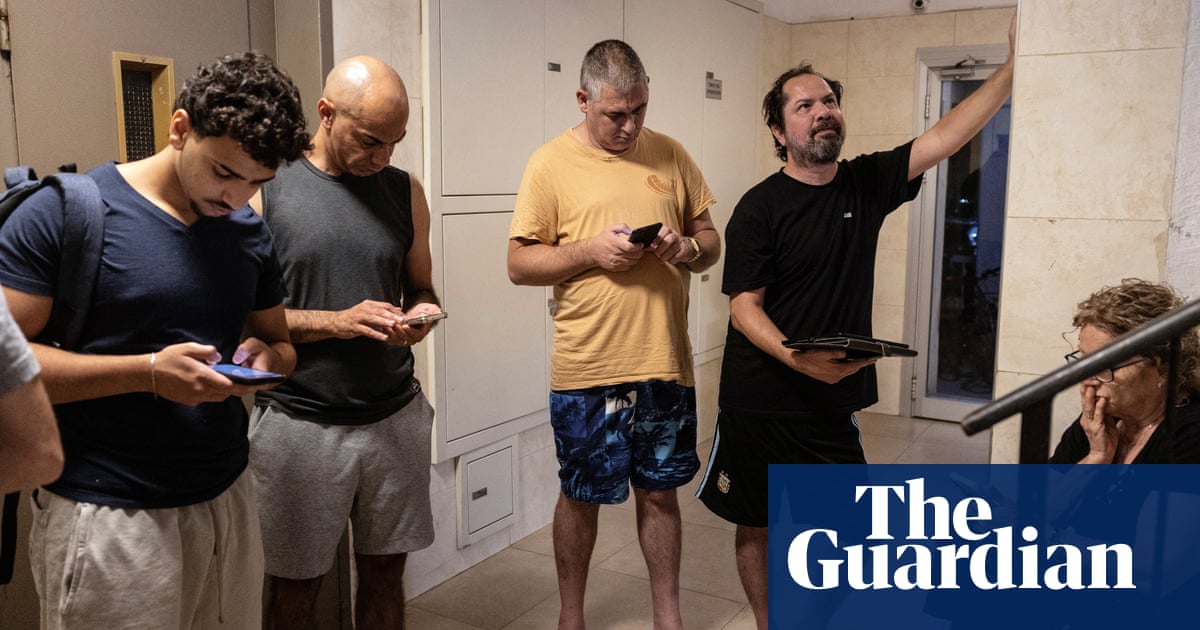Trepidation mixed with triumphalism inIsraelon Friday, after an unprecedented attack on Iran’s military and nuclear programme brought ordinary life to an abrupt halt.
The country’s main airport was closed “until further notice” with no flights expected for days and hospitals began moving hundreds of vulnerable patients to emergency underground facilities and sending home anyone who could be discharged.
From Jerusalem to Tel Aviv, streets that are normally crowded at the start of the weekend were empty on Friday morning, with most shops and cafes shuttered.
There were long queues at the handful of places still open as people rushed to get last minute supplies of essentials, canned goods for some and espressos for others.
“I am not giving up on my coffee, but I’m heading back home now,” said Guy Weinberg, 30, who had been woken by sirens at 3am and spent the night in a shelter with his sister and niece.
Nearly two years into Israel’s longest war, people have got used to alarms warning of missiles fired by Yemen or rockets from Gaza. But this felt different, he said.
“After seeing all the people who have been killed there, it is clear [Iran] will try to attack back. We don’t know where or when, but we are ready.”
The TV studios were as frenetic as the streets were empty, with all the main channels going live from the moment news of the attacks first broke.
The dominant mood was celebration, as military correspondents and analysts pored over satellite images and grainy video to discuss Israel’s targets, methods and the impact of their strikes.
“Interim summary: a glorious intelligence and operational success for the State of Israel. The (air raid) alarms at 3am were unnecessary,” said Roy Sharon, a military correspondent and analyst with Kan news, in one post on X that captured national pride at Israel’s ability to strike high-level targets deep inside Iran
Sigalit, 50, and Barack, 54, teachers from southern Israel who had come to Tel Aviv for pride weekend, agreed. “We feel safe now, more safe than ever, because we know we destroyed their nuclear weapons,” said Sigalit.
Even so, the couple were heading back home after just one night because the parties had been cancelled, and they worried traffic might build up on roads out of Tel Aviv.
Tourists who flew in from further away, including the parade’s guest of honour, Caitlyn Jenner, were stranded in Israel and Israelis abroad took to social media to ask for help getting home.
Most international airlines rapidly suspended flights to Israel. Even Israel’s national carrier El Al, which has flown almost without interruption throughout the war in Gaza, cancelled flights on Friday, told travellers with tickets for Saturday and Sunday not to come to the airport and said it had suspended bookings through to the end of the month.
For Palestinians in the occupied West Bank, the attacks brought a paralysing shutdown, with roads and checkpoints closed as Israel focused its military attention on Iran.
The Palestinian Red Crescent warned that the blockades were costing lives because they were struggling to reach patients with ambulances or get them to hospitals. Israel also closed al-Aqsa mosque in Jerusalem, one of the holiest sites in Islam, and often a flashpoint for regional tensions.
In an address to the nation overnight, the Israel prime minister, Benjamin Netanyahu, had told people the crisis “may take much longer than you are used to” and urged Israelis to stock up on supplies “but the most important thing is to equip yourself with patience”.
As attacks on Iran continued through Thursday, some in Israel said they were determined to carry on with normal life. Keter Benchimol, 55, had just flown back into Israel and on Friday she was headed to the beach with her son for a swim.
Stretches of sand normally packed with sunbathers were emptier than usual but not deserted. “There’s no need to fear, God has us. If it’s my day to go, I could go anywhere,” she said, in a sentiment echoed by dozens of others. “I’m just relieved to be back here with my kids, not worrying about them from far away.”
